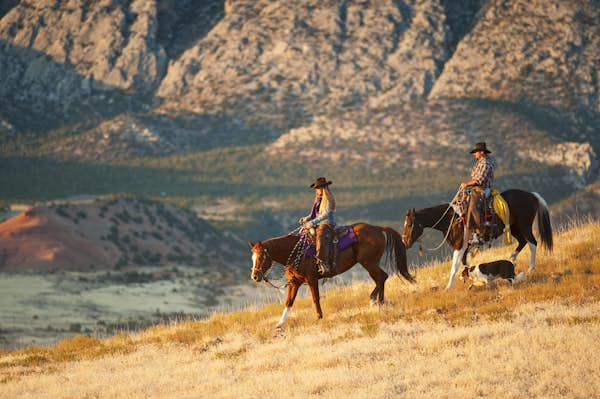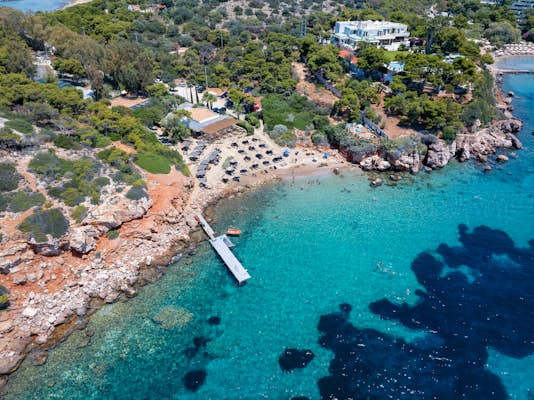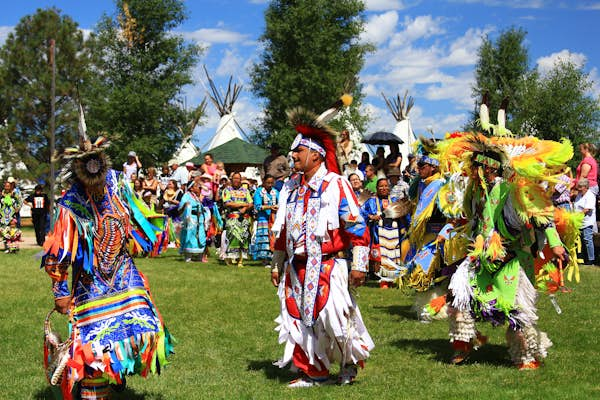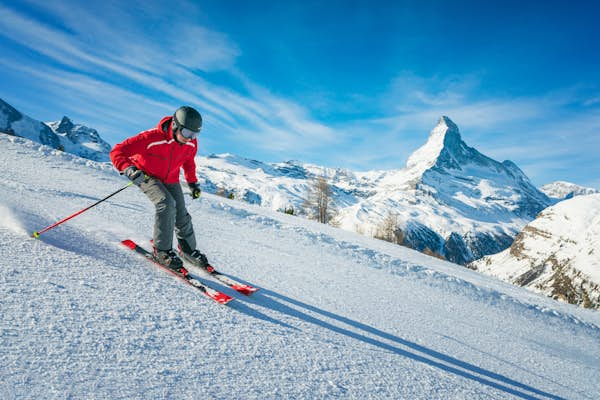
A ski guide to Valais: finding your slope in southern Switzerland
Switzerland might appear small on paper, but it’s a hell of a lot bigger when you look up. Welcome to one of Europe’s most mountainous countries, where the Alps ripple across 60% of its territory. With a whole lot of vertical, it’s all about peak performance here – the Swiss are practically born on skis and four-year-olds will often whizz rings around you on the slopes. And the rush is never greater than where the glacier-capped Alps are at their highest: Valais, a canton tucked away in the south of Switzerland and straddling the Italian border.
When the first flakes fall in winter, the land of mighty Matterhorn and the 4634m Dufourspitze, Switzerland’s highest peak, has skiers itching to hurtle down the pistes or make fresh tracks in the backcountry. And whether you’re a black-run thrill seeker, a lover of cruisy blues with big views, or an absolute beginner, there’s a run with your name on it. Read on for our seven absolute faves.

Zermatt
Best for riveting Matterhorn views and skiing into Italy
Let’s begin with the big one… You never forget the first time you clap eyes on 4478m Matterhorn: that perfect pyramid-shaped peak that says Switzerland (and Toblerone) like no other. Most likely it will be a fleeting glimpse from the little red train that chugs from Visp to Zermatt. Once you arrive, there are distractingly lovely vistas from the slopes, which are the country’s highest, topped off by the 3883m Matterhorn Glacier Paradise cable car station, where you can swoon over views of 14 glaciers and 38 mountain peaks over 4000m.
Car-free Zermatt makes a terrific base for hitting the pistes, which amount to 360km when coupled with over-the-mountain Cervinia in Italy (much easier to reach since the 2023 launch of the Matterhorn Alpine Crossing). The cruisy slopes around Rothorn, Stockhorn and Klein Matterhorn suit confident intermediates, while plenty of great off-piste areas will please powder hounds (though getting a guide is wise). Likewise, there is fine skiing for beginners and families at Wolli Park Sunnegga, and a snowpark with rails, boxes, jumps and kickers for boarders. A bonus for families is that kids under nine ski free.
Planning tip: One of the world’s most scenic train rides, the Glacier Express makes the 290km, eight-hour journey between Zermatt and St Moritz twice daily from mid-December to early May.
Arolla
Best for quiet, uncrowded slopes and heavenly off-piste
Huddled away in the deeply traditional Val d’Hérens, and with pop-up views of glacier-encrusted 4000m peaks, the sleepy hamlet of Arolla has a backdrop out of all proportion with its size (population 200). Sitting at a giddy 1998m, the endearingly Alpine village has an impeccable snow record, ravishing scenery and 47km of downhill slopes to whoosh down – mostly blues and reds geared toward beginners and intermediates respectively. By Swiss standards, it’s reasonably inexpensive, too.
Given its remoteness, there’s fine off-piste terrain for ski touring (best tackled with a guide who knows the slopes inside out). The village forms a leg of the famous high-level, week-long Haute Route from Zermatt to Chamonix, which threads through the Mont Blanc massif. One of Europe’s toughest and most memorable skis, it’s suitable for expert ski tourers only.
Planning tip: It’s not just about the downhill; there are 42km of cross-country ski tracks where you can glide to a glacier in quiet exhilaration, not to mention an extensive network of snowshoe trails, including the 5km stomp from La Gouille to shimmering, forest-ringed Lac Bleu.

Verbier
Best for challenging slopes and celeb spotting
Cradled in a south-facing bowl, glamorous, celebrity-magnet Verbier is the Swiss king of cool, with seriously hard-core skiing spread over elevations of 1500m (the village) to 3330m (Mont Fort). Its pulse-quickening black runs, glorious off-piste, narrow couloirs and mogul-spotted itinerary routes challenge even super-adventurous skiers – the toughest being the mythical freeride Tortin. Freeriders and boarders are in their element at the 2250m-high La Chaux snowpark. Right at the heart of Les 4 Vallées ski area, with soul-stirring views of the Mont Blanc and Combins massifs, the resort has a fabulous snow record and access to more than 400km of marked pistes, many of which target bold intermediates.
The skiers that flock here – royals, James Blunt (who has a lift named after him), Richard Branson (owner of ultra-luxe mountain hideaway The Lodge), the Beckhams, Leonardo DiCaprio and Ed Sheeran included – party just as hard as they pound the powder. The champagne-fuelled après-ski scene here is legendary.
Planning tip: If you want to find fresh powder in the backcountry, check out Les Guides de Verbier. Besides off-piste guiding, they also offer ski touring, ice climbing and snowshoeing.
Crans-Montana
Best for sun and sparkle
On a high plateau above the Rhône Valley is the ritzy ski resort of Crans-Montana, where 160km of largely south-facing slopes, linked by ultra-modern cable cars, are perfect for confident beginners and cruisy intermediates, especially around the Cry d’Er section. And the 360-degree views are phenomenal, taking in white giants like the Matterhorn and Mont Blanc.
There are a few black runs in the mix, including the breathtakingly steep World Cup Piste Nationale, one of the longest downhill runs in the Alps. But that’s just the tip of the iceberg: you’ll also find ski mountaineering trails, a snowpark with a superpipe for boarders and freestylers, Plaine Morte glacier for ski-high cross-country skiing, and a happening après-ski scene. The latter cranks up a notch during the end-of-the-winter-season Caprices music festival, which brings big-name acts to the slopes.
Planning tip: One of the hippest mountain hangouts in the Swiss Alps at 2112m, Chetzeron has gasp-eliciting views from its terrace, where you can snag a hammock or sheepskin-clad deckchair to sip chocolat chaud (hot chocolate) post-ski. Reach it by ski or snowboard from the top of Cry d’Er cable car.

Bettmeralp-Aletsch
Best for serene slopes and glacier gazing
Imagine the Swiss Alpine village of your dreams, times it by 10 and you’ll probably conjure up something like Bettmeralp: snowbound, mountain-rimmed, sprinkled with dark-timber chalets and perched high above the Upper Rhône Valley at 1970m. In winter it’s pure Christmas-card stuff. And with just 452 permanent residents, this family-friendly hamlet naturally has a far more chilled vibe than the bigger resorts.
On the often sunny, car-free plateau, there are 104km of pistes forming the Aletsch Arena to play on. At the heart of the Unesco World Heritage Swiss Alps Jungfrau-Aletsch region, these are largely geared toward intermediates, snowboarders and off-piste thrill-seekers, but there is also ample terrain for beginners and experts.
Planning tip: Skiing doesn’t get more ludicrously lovely than on the run from the 2627m Bettmerhorn cable car top station, shadowing the 23km Aletsch Glacier, the longest glacier in the European Alps.
Champéry
Vast slopes and skiing to France
Nudging France in the northwest of Valais, Champéry forms part of Les Portes du Soleil (“Gates of the Sun”) ski area, comprising a whopping 600km of pistes spread across two countries and 12 resorts, making it one of the biggest in the world. A single pass covers the lot.
Dwarfed by the jagged, multi-summited Dents du Midi, Champéry’s wide slopes and long valley runs are well suited to intermediates (beginners will find them a little tough). Boarders head across to Avoriaz and Les Crosets for terrain parks. Black runs and some substantial off-piste ramp up the challenge for experts.
Planning tip: La Chavanette, otherwise known as the “Swiss Wall,” is a real thigh-burner of a ski – with a 37° slope and 76% gradient, it’s so breathtakingly sheer it’s like leaping into the void, and there are so many moguls that there is no respite from bumps along its entire length. It’s classed as an itinéraire (avalanche controlled but not patrolled).

Saas Fee
Best for freeriders and boarders
Hemmed in by an amphitheatre of 13 implacable peaks above 4000m, glacier-licked Saas Fee sits at the foot of the 4546m Dom – the second-highest mountain in Switzerland and the third-highest in the Alps. As you might expect, the scenery is out of this world. And with skiing between elevations of 1800m and 3550m, there’s always fantastic powder to find.
A happening resort today, Saas Fee was an isolated outpost only reachable by mule trail until 1951. Now the car-free resort is an architectural mix of traditional dark-wood granaries sidling up to modern chalets. The skiing on 145km of runs is overall fairly gentle: great for beginners and easy-going intermediates, though the 1700m top-to-bottom descent of the mountain ups the challenge. Experts can tackle the Weisse Perle black run and hook onto guided ski tours, while boarders find big air thrills at Morenia snowpark.
Planning tip: If you fancy a post-ski snack with a view, hop on the underground funicular to 3500m Allalin, home to the world’s highest revolving restaurant.
Make it happen
Geneva Airport (GVA) is the gateway to the Valais region, with fast, frequent and scenic SBB rail connections to all the major ski resorts. Taking the train, in fact, is often preferable to driving, as many resorts are car-free. Buses and cable cars fill in the gaps.
The ski season runs roughly from December to April. For better deals and more availability, avoid peak season (Christmas and Easter). You can often beat the queues and save money by purchasing ski passes and organising ski hire online with Intersport. For group tuition, check out Swiss Ski Schools.
You May Also Like
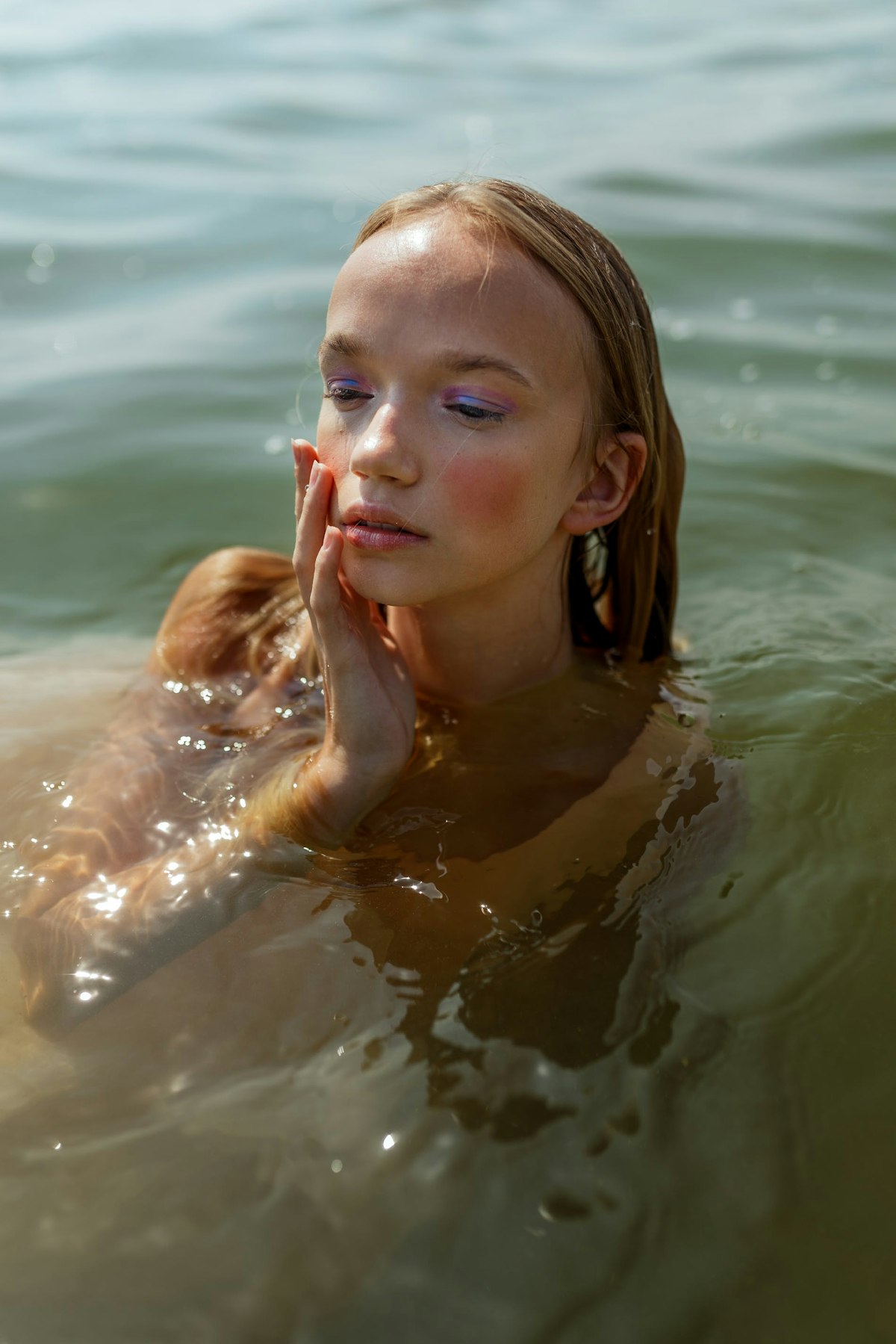
A Guide to Sea Moss and All of Its Natural Health Benefits
March 3, 2024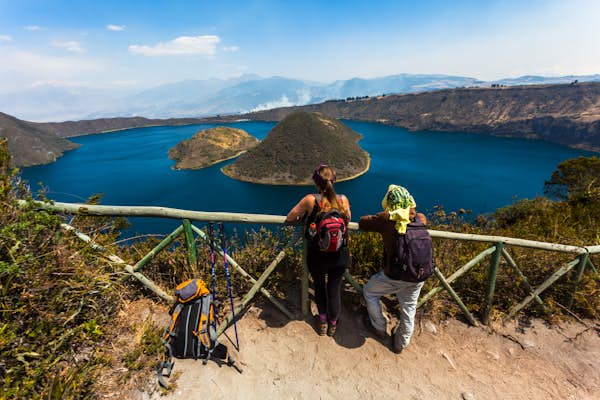
Ecuador’s best hikes: 6 treks worth the sweat
December 27, 2023